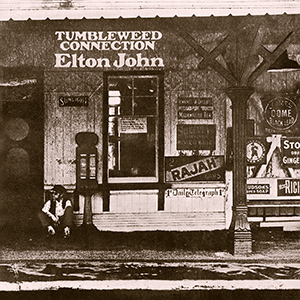
Tumbleweed Connection
Tumbleweed Connection is the third studio album by English singer-songwriter Elton John. It was recorded at Trident Studios, London, in March 1970, and released in October 1970 in the UK and January 1971 in the US. It is a concept album based on country and western and Americana themes. All songs are written by John and Bernie Taupin, with the exception of "Love Song" by Lesley Duncan.
Tumbleweed Connection
In 2012, Tumbleweed Connection was ranked number 458 on Rolling Stone magazine's list of the 500 greatest albums of all time. The album peaked at number two on the UK Albums Chart and number five on the US Billboard 200 chart.[3][4][5] In the US, it was certified gold in March 1971 and platinum in August 1998 by the RIAA.
Background[edit]
Co-writer Bernie Taupin said of the album, "Everybody thinks that I was influenced by Americana and by seeing America first hand, but we wrote and recorded the album before we'd even been to the States. It was totally influenced by The Band's album Music From Big Pink and Robbie Robertson's songs. I've always loved Americana, and I loved American Westerns. I've always said that 'El Paso' was the song that made me want to write songs, it was the perfect meshing of melody and storyline, and I thought that here was something that married rhythms and the written word completely." John has remarked, "Lyrically and melodically, that's probably one of our most perfect albums. I don't think there's any song on there that doesn't melodically fit the lyric."[6]
Basic tracks for three of the album's titles, "Come Down in Time", "Country Comfort" and "Burn Down the Mission", were recorded at Trident during the sessions for the previous LP, Elton John, with overdubs completed for Tumbleweed Connection. An early version of "Madman Across the Water", featuring Mick Ronson on electric guitar, was also recorded during the sessions for the album. It was released on several albums and reissues of Tumbleweed Connection, though the track was ultimately re-recorded for the Madman Across the Water album.[7]
Dee Murray and Nigel Olsson appear for the first time together on this album as the rhythm section on "Amoreena". Olsson had played on one track on Empty Sky for John in 1969. It is Murray's first appearance on an Elton John album. In addition to several studio players who also performed on John's previous self-titled second album, several tracks feature backing musicians from the band Hookfoot, who were also his DJM Records label mates. Hookfoot guitarist Caleb Quaye and drummer Roger Pope had also appeared on John's Empty Sky album.
No singles were released from the album in the US by either DJM or John's US distributor, Universal Records, but "Country Comfort" (b/w "Love Song") was released as a single in Australia, New Zealand and Brazil.[8] It peaked at No. 15 in New Zealand,[9] and did not chart in the other two territories it was released in.
Artwork[edit]
The wraparound cover photo for the album was taken at Sheffield Park railway station in Sussex, approximately 30 miles (50 km) south of London on the Bluebell Railway. Photographer Ian Digby Ovens[10] captured John (seated to the right in the photo but appearing to the left on the front cover, shown above) and Taupin (standing to the left, on the back cover) in front of the late-nineteenth-century station, to represent the album's rural Americana concept despite the English location. Additional photos were taken from the interior of a train on the line for the album liner notes and libretto.
In August 2020, the Bluebell Railway announced that, to mark the 50th anniversary of the release of the album, it had restored the station to look as it did when the cover photo was taken, giving people an opportunity to re-create the scene in their own photos.[11]
Track numbers refer to CD and digital releases of the album.